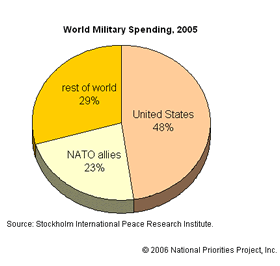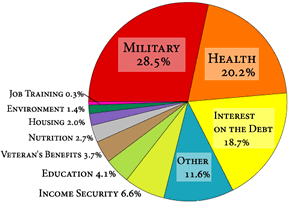Poetry for Peace in a Time of War:
On the Fourth Anniversary of the Iraq War
For Sunday March 25, 2007
Fifth Sunday in Lent
Lectionary Readings (Revised Common Lectionary, Year C)
Isaiah 43:16–21
Psalm 126 or 119:9–16
Philippians 3:4b–14
John 12:1–8
|
Cost of the War in Iraq
(JavaScript Error)
|
A few days ago as I was walking our dog my accountant friend Mike called to say that he had finished our 2006 taxes. He asked a few questions to clarify matters, chatted about our kids, and then advised me to contribute to my IRA in order to reduce my tax bill. As I walked home I began to relish the thought of diverting money from the government.
As we mark the fourth anniversary of the United States invasion of Iraq (March 19, 2003), simple arithmetic tells me that I've personally funded the war to the tune of $1300. So did my wife and three children. So did you, and every one of our 300 million citizens. The war now costs about $2 billion per week, with more than $400 billion spent so far. Some economists estimate that the true cost of the war will run into the trillions. It feels surreal to recall that the White House estimated that the war would cost $50 billion max, that White House adviser Lawrence Lindsey was fired for saying the war might cost up to $200 billion, and that Deputy Defense Secretary Paul Wolfowitz and others assured us that Iraqi oil revenues would underwrite the war for $50 billion a year.
It's worse when you consider that according to the National Priorities Project, 28.5% of every tax dollar that you send to Washington goes to the military. Education receives 4%, housing 2%, veterans benefits 1.7%, and the environment 1.4%. In 2005 the United States accounted for 48% of the entire world's military spending, down slightly from 2003 when we spent more on the military than the rest of the world combined. I've always wondered why we expect other countries to demilitarize, given the example we set. To me, spending 28.5% of federal revenue on the military feels immoral.
Then there are the human costs of the war. Death, mutilation, maiming, and injuries devastate not only bodies but also human hearts, minds, lives, and spirits. As of March 7, 2007 there were 3,444 coalition deaths in Iraq (3,187 of whom were Americans). I hope you'll take a few moments to honor them and their families by clicking "HERE" to view their names and faces. 23,000 Americans have been wounded, and with the Walter Reed scandal we now know just how poorly our government cares for them. Nearly 20 times as many Iraqi civilians have died—about 60,000. The British medical journal Lancet puts the figure at 655,000. Two million Iraqis have fled their country, and another two million have been displaced from their homes inside the country.
The Iraq war has cost dearly in many other ways. We've alienated ourselves from our friends, militarized international diplomacy, and enraged our enemies. Abu Ghraib, Guantánamo, Haditha, renditions, no-bid reconstruction contracts, and domestic wire taps have undermined the credibility of our commitment to human rights, rule of law, and democracy. The Iraq war has destabilized the greater Middle East region and supported the jihadist view of history that America wants to occupy, control or destroy their countries. War critics have been harassed and caricatured as unpatriotic. We have believed dangerous misconceptions about American exceptionalism. With no exit strategy, no promise that we will not maintain permanent bases in Iraq, and Bush's statements that he will pass the war on to his successor, there's no end in sight.
Perhaps these costs have been worth it? Not according to most Iraqis. In November of 2006 the Iraq Centre for Research and Strategic Studies conducted face-to-face interviews with 2,000 Iraqi adults in Baghdad, Anbar and Najaf. When asked, "Do you feel that the situation in the country is better today or better before the U.S.-led invasion?", 90% of the respondents said that their lives were better before the war (the margin of error was 3.1%).
Human cost of the Iraq war. |
Over a year ago even conservative commentators like William Buckley had concluded that "one can't doubt that the American objective in Iraq has failed." In November 2006 George Will wrote that "many months ago it became obvious to all but the most ideologically blinkered that America is losing the war launched to deal with a chimeric problem (an arsenal of WMD) and to achieve a delusory goal (a democracy that would inspire emulation, transforming the region)." Former neo-conservatives like Andrew Bacevich and Francis Fukuyama have written entire books to distance themselves from what they now regard as our catastrophic foreign policy. In his new book Second Chance: Three Presidents and the Crisis of American Superpower (2007) Zbigniew Brzezinski describes the war as "suicidal statecraft."
This week's Old Testament reading from Isaiah 43:16–21 is a piece of war poetry that has as its context Israel's past domination by Pharaoh's Egypt and its (then) present subjugation by the super-power Assyria. Isaiah reminds his readers that the Hebrew God was one who vanquished military violence in the past and that He would do so again. Yahweh, wrote Isaiah, "drew out the chariots and horses,/ the army and reinforcements together,/ and they lay there, never to rise again,/ extinguished, snuffed out like a wick." Isaiah dares his readers to imagine a new future of peace that he likens to streams in the parched desert.
The war in Iraq and the peace poetry of Isaiah call to mind the radical witnesses of four prophetic Christians. They remind us that the priorities of church and state, throne and altar, are as different as parallel universes traveling in opposite directions.
 |
Pie chart of world military spending in 2005. |
After the emperor Theodosius (347–395) slaughtered 7,000 people in Thessalonika "most unjustly and tyrannically," bishop Ambrose of Milan (340–397) physically prevented him from entering his church. The Syrian bishop Theodoret (c.393–466) recorded the drama in his Ecclesiastical History (V.17-18): "You must not be dazzled by the splendor of the purple that you wear," thundered Ambrose to Theodosius. "How could you lift in prayer hands which are stained with the blood of such an unjust massacre? Go away, and do not add to your guilt by committing a second crime." Emperor Theodosius "submitted to the rebuke, and with many tears and groans returned to his palace." Ambrose later restored him after thirty days of public penance.
When we moved to Moscow in September 1991 a defrocked dissident priest named Gleb Yakunin was grabbing headlines. During the Soviet period Yakunin was a champion of religious freedom and a harsh critic of the Russian Orthodox Church's cooperation with the government. Because of his prophetic stance he was barred from the priesthood, imprisoned for five years, banished to internal exile for another five years, and then finally released in 1987. After his release he continued his outspoken criticisms as a political leader in Russia's emerging democracy, and eventually was elected to the parliament. When he published materials from the newly accessible KGB archives about church leaders who served as KGB agents, and demanded that the Orthodox Church publicly repent, the patriarchy had had enough. In 1997 it excommunicated him from the church.
The peace activist and Jesuit priest Daniel Berrigan (b. 1921) spent considerable time in prison for his civil disobedience against government policies on racism (he marched in Selma), nuclear arms, and most famously Vietnam (he is also pro-life). In her memoir Things Seen and Unseen Nora Gallagher recalls meeting Dan in the spring of 1986. When she asked how many times he had been jailed, he responded, "Not enough."
 |
Where your federal taxes go. From the National Priorities Project. |
Dan's younger brother Phil (1923–2002), also a Catholic priest, was arrested more than 100 times and served a total of 11 years in prison for acting on his conviction that the Gospel of Jesus constituted a higher law than the civil laws he disobeyed: "It's spelled out in Scripture, it could not possibly be more clear. It's spelled out in the wisdom of Isaiah, with its injunction to beat swords into plowshares and to learn war no more. To be acceptable to God, it says, we must forsake our weapons, destroy them, live as brothers and sisters in peace and love. Christians do not hate, Christians do not kill, Christians love their enemies. It's difficult. . . But I do know that being a Christian is about non-violence. It's about justice. It's about being outraged at the way we destroy each other." At one point both Berrigans were on the FBI's Ten Most Wanted Fugitives list for their anti-war activities.
Ambrose, Yakunin, and the Berrigans remind us that if Jesus is Lord, then Pharaoh and Caesar are not Lord. Loving and praying for your neighbor, and especially your enemy, subverts the will to war that would destroy them. Inspired by their examples, in a meager attempt to move beyond silence and apathy, Sunday March 18 found me in San Francisco at the Justin Herman Plaza where I joined other citizens protesting for peace in Iraq.
For further reflection:
* Do you think the United States is more militaristic than other countries?
* What are you feeling and thinking about our four years in Iraq?
* Consider this conundrum: Jesus calls believers to do something that states and governments cannot and should not do: love our enemies.
* Watch the documentary film Sir! No Sir! about active duty soldiers who protested the Vietnam war.
* Cf. the book Second Chance: Three Presidents and the Crisis of American Superpower (2007) by Zbigniew Brzezinski.
* Watch the Iraqi films Turtles Can Fly, The Dreams of Sparrows, and Control Room, all of which I obtained at Hollywood Video.





